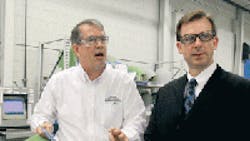Plant Managers Assume More Profit-Driving Responsibilities
Traditionally, manufacturers have relied on plant managers to ensure the production process moves forward as smoothly and efficiently as possible. But increasing competitive pressures have changed the way many manufacturers view the role of the plant manager.
The modern plant manager needs to be more than a "traffic cop" but someone who is involved in critical decision-making activities that impact profits, says Miles Free, director of industry research and technology at the Precision Machined Products Association in Brecksville, Ohio.
Free, a former plant manager at Republic Engineered Products, refers to the evolving plant manager role as a "profitability engineer."
"A profitability engineer is kind of like a wild animal. He's going where the prey are," Free explains. "You're not going to find him in one place. He might be involved in doing that first article inspection, helping do the runoff on the new production, helping qualify a new machine or process. He may be at a customer meeting to make sure they fully understand the requirements or talking to a supplier about their capabilities."
Building products manufacturer Saint-Gobain (IW 1000/67) seeks plant managers who are financially literate with a strong business sense, says James Thomson, senior vice president of human resources for Saint-Gobain in North America.
The division of France-based Compagnie de Saint-Gobain tries to identify plant managers who are aware of the marketplace and how they can position their plant for an economic advantage, Thomson says.
Business Savvy
"I think you're dealing with people who are much more sophisticated from a business point of view than was the case a generation ago," Thomson says. "Often we find that although the job remains very technical, I think some of our most successful plant managers are not from a deep technical background. They're just very good at marshalling the resources they need."
While the position has evolved, many manufacturing leaders continue to bog down plant managers with nonvalue-added activities, says Free.
"I think what the top management hasn't figured out is that you have to take something else off this guy's plate so he can be where he's most effective," Free says. "What I'm suggesting is the profitability engineer should be a full-time focus."
Plant manager backgrounds can vary depending on the type of manufacturing environment. For instance, in the machined products industry, more technical expertise might be preferable.
Free says business school backgrounds aren't always necessary for the position he calls a profitability engineer.
"A profitability engineer is probably not going to be a business school graduate as much as a specialist in engineering, process or statistics and expanding to do more of a generalist role," he says.
At Saint-Gobain, plant managers don't necessarily need a high level of technical expertise, Thomson says. Candidates often have military or business school backgrounds, he notes, with skill sets that equip them to make use of disparate resources and even serve as community relations experts.
"In some cases our plant is a significant element in a small town in a rural area so they need to have a real sense of how a facility fits into a community," Thomson says
See also:
Plant Manager Today, CEO Tomorrow
IW Forums: Are Plant Managers Obsolete?
Siemens Educates Future Plant Managers With Game
About the Author
Jonathan Katz
Former Managing Editor
Former Managing Editor Jon Katz covered leadership and strategy, tackling subjects such as lean manufacturing leadership, strategy development and deployment, corporate culture, corporate social responsibility, and growth strategies. As well, he provided news and analysis of successful companies in the chemical and energy industries, including oil and gas, renewable and alternative.
Jon worked as an intern for IndustryWeek before serving as a reporter for The Morning Journal and then as an associate editor for Penton Media’s Supply Chain Technology News.
Jon received his bachelor’s degree in Journalism from Kent State University and is a die-hard Cleveland sports fan.
